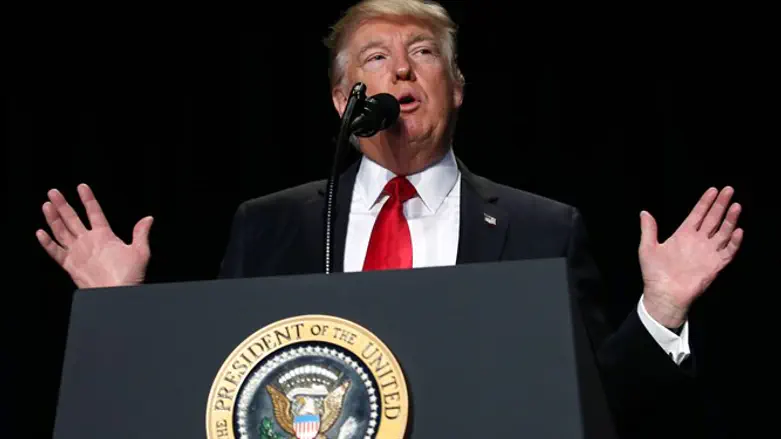
On Friday, Israel Hayom published an interview with President Donald Trump, the first he has granted to an Israeli media outlet since taking office in January.
The interview was released just hours after President Trump dined with Israel Hayom owner and GOP donor Sheldon Adelson at the White House Thursday evening.
In the interview, the president, who is slated to meet with Prime Minister Binyamin Netanyahu next week, praised the Israeli premier, but said he felt the recent announcements of housing projects in Judea and Samaria did not improve the prospects for peace in the region.
“I know Israel very well,” said Trump, “and I respect it; I want to get peace between Israel and the Palestinians and even more than that.”
President Trump said on his relationship with Netanyahu: We've always had good chemistry, and he is a good man. He wants to do the right thing for Israel. He would like peace; I believe that he wants peace and wants to have it badly. I have always liked him."
But, Trump continued, he did not understand how expansion of Jewish communities in Judea and Samaria would promote peace.
“There is limited land left, and every time you take land for settlements, there’s less land left. I’m not someone who believes that advancing the settlements is good for peace. But we’re checking all the possibilities.”
Regarding America’s relationship with Israel, the president predicted that ties between the two countries would strengthen, claiming that the 2015 Iran nuclear deal negotiated by the Obama White House had brought relations with Israel to a nadir.
“We’ll have better relations with Israel. The agreement with Iran was a disaster for Israel, it’s unbelievable, both in terms of how it was negotiated and the way it was implemented. Everything about this deal is terrible. As a businessman I know how to tell a bad deal from a good deal. This deal is impossible to understand. I can’t understand it. And you can see how Iran is behaving: instead of thanking Obama, who was so biased in their favor, they acted arrogantly even before he left the White House. It’s a shame this deal was made.”
Trump also said despite his disagreement with Israel over the expansion of Jewish towns in Judea and Samaria, he would not condemn Israel.
“I don't want to condemn Israel. Israel has a long history of condemnations and challenges. I don't want to condemn Israel during my administration. I understand Israel very well and respect it very much. Israelis have gone through very difficult periods. I want peace between Israelis and Palestinians and even more than that. I think peace for Israel would be great for Israel, not just good."
When asked whether he planned to fulfill his campaign pledge to relocate the US embassy to Jerusalem, the president said he was still considering the issue.
"I want Israel to behave sensibly during the peace process, that it should come after so many years. And maybe there will even be the chance for a bigger peace than just an Israeli-Palestinian [deal]. I want both sides to behave reasonably, and we'll have better chances that way.
"I'm thinking about it. I'm learning the subject, and we'll see what happens. It's not an easy decision. It's already been debated for years. No one didn't want to make the decisions, and I'm thinking very seriously about it."
President Trump reiterated his optimism regarding the prospects for a comprehensive Middle East peace, though he acknowledged that many of his own advisers have suggested such an achievement is impossible.
"No deal is good if it's not good for both sides. Right now we're in a process that's lasted for years, decades. A lot of people think that it is impossible to do this [to reach a final status agreement], a lot of smart people around me say it is impossible to reach an agreement. I don't agree with them. I think that it is possible to reach an agreement, and we need to reach an agreement."
